Visiting a leprosy colony changed this woman's lifepublished at 00:35 GMT 12 December 2021
A Nigerian woman living in the US never imagined that leprosy still existed in her home country.
Read MoreA Nigerian woman living in the US never imagined that leprosy still existed in her home country.
Read MoreFormer international Samuel Eto'o will run Cameroonian football for the next four years after being elected head of the country's FA on Saturday.
Read MoreSouth Sudan investigates whether senior officials are travelling abroad without being tested.
Read MoreIsabel dos Santos, daughter of a former Angolan president, is accused of "significant corruption".
Read MoreWe're back on Monday
That's all from the BBC Africa Live team for now. We'll be back on Monday morning Nairobi time.
Until then there will be an automated service and you can find the latest updates on the BBC News website, or listen to our podcast Africa Today.
Our African proverb of the day:
Quote MessageThe dog that is bound to get lost will not listen to the hunter’s whistle."
A Yoruba proverb sent by Abdussemiu Aliu Lambe in Sokoto, Nigeria.
Click here to send us your African proverbs.
And we leave you with an image from our selection of some of the best pictures from the continent this week.
It shows supporters of Gambia's opposition presidential candidate Ousainou Darboe at a rally last week:
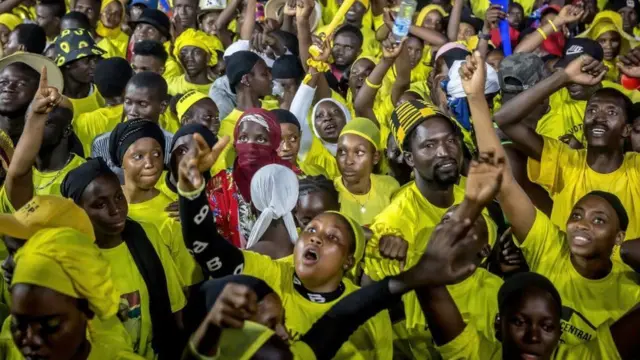 Image source, Getty Images
Image source, Getty Images DJ Edu
DJ Edu
Presenter of This Is Africa on BBC World Service
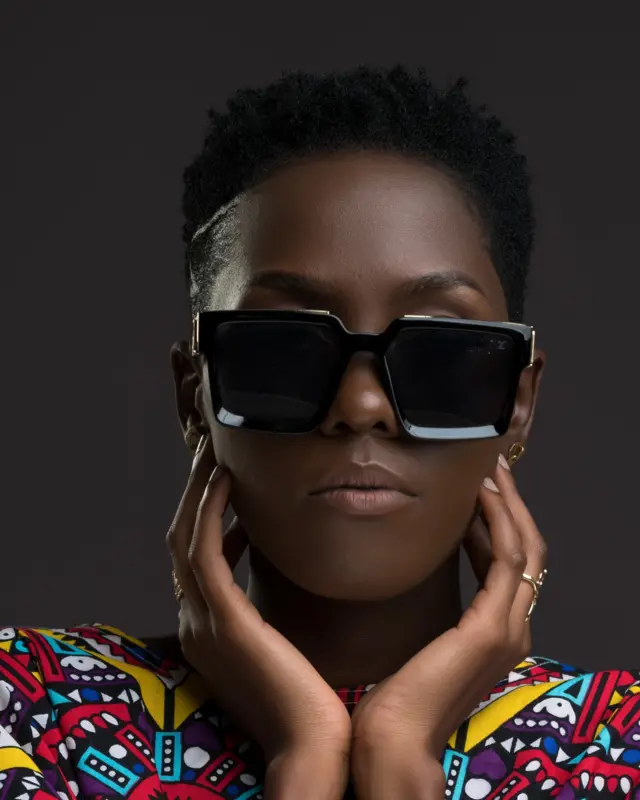 Image source, Guilo Molfese
Image source, Guilo MolfeseAzawi is taking Uganda by storm, but there’s something endearingly unassuming about the country’s newest sensation.
She started her professional career in music by writing songs for other people, and could not have been more surprised when the Ugandan label Swangz Avenue offered to sign her as an artist.
“In my mind I was just going to their offices to be paid for the music I had forwarded to them, but the big guy was like 'why don’t we work together?'," she tells This is Africa.
"That moment I froze! Now I’m getting an opportunity to sing my own music, perform it, write my own songs. I didn’t see it coming.”
Azawi’s breakthrough song was Quinamino, released at the start of 2020.
She knew it was special.
“Within myself I was like, 'I wish I had everything it takes to bring this song out in the public'. There was something so organic, so real, so special about the beat.
"It actually took me something like 40 minutes to write that song and I have to say 40 minutes changed my life.
“Music is like love honestly. It is something that has to connect with the soul, you have to feel it deep within… I don’t know if I’m making sense!”
Azawi’s music is certainly connecting.
After Quinamino, came the hit Slow Dancing, then an album, African Music.
Her most recent single is the equally accomplished Ache for You.
In October her image was projected in New York City’s Times Square after she was chosen as one of just eight artists to represent Africa at the YouTube Black Voices Class of 2022.
Others included in this mentorship programme are CKay and Omah Lay from Nigeria, and DJ Lag and Major League DJz from South Africa.
It sounds a bit like overnight success, but Azawi has been steadily working up to this.
As a child she was part of a traditional dance troupe, and then at school she was in choirs and composed songs under the supervision of an encouraging teacher.
“I have always been passionate about music. I would say it’s like an expedition that was planned out in a way that I wasn’t conscious about, but it made sense.
"Every part of my journey was really fundamental and important in how I create my music.
“Right now it’s like magic. At some point it’s really too much for me to even comprehend and understand - but I just thank God that he let it happen just the way I was dreaming of it way back.”
You can hear Azawi this weekend on This Is Africa on BBC World Service radio and partner stations across Africa, and online here.
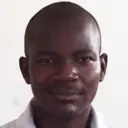 Ishaq Khalid
Ishaq Khalid
BBC News, Abuja
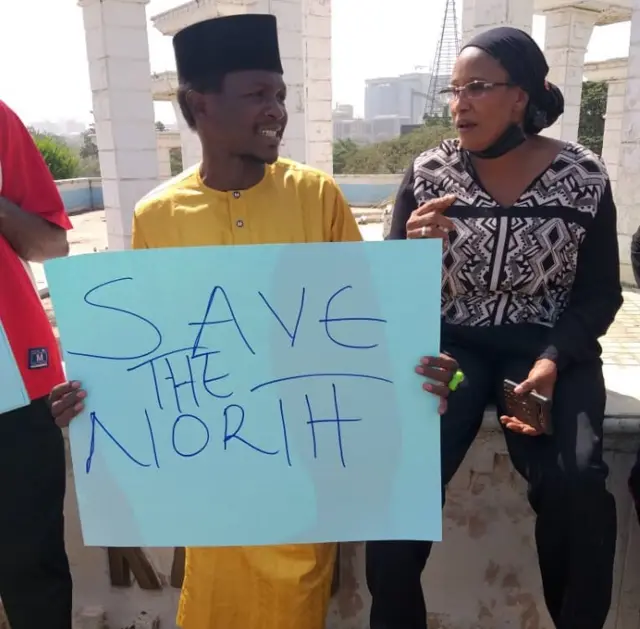
Protesters gathered in several cities including the capital, Abuja
Hundreds of people have taken to the streets in several cities in northern Nigeria and the capital, Abuja, demanding action by the authorities to end the worsening violence sweeping through the region.
Armed gangs have recently stepped up killings and kidnapping people for ransom including students, travellers and worshippers.
In Abuja, protesters gathered at the popular Unity Fountain square to highlight the deepening insecurity.
Demonstrators vowed to continue with the protests.
They said the government is not doing enough despite the deployment of thousands of troops.
In some of the latest attacks this week at least 16 people were shot dead in a mosque and dozens of passengers burnt alive by gunmen.
As Tanzania marks its 60th independence anniversary this week, a publishing house dedicated to promoting Swahili books also celebrated its birthday.
Mkuki na Nyota, meaning "speared star", was created 40 years ago in Tanzania with the aim of producing "books that contribute to our understanding of our own realities that help people struggle for their own liberation", founder Walter Bgoya told BBC Focus on Africa.
It produces both non-fiction - including biographies of the country's presidents - and fiction. One if its recent novels, known as A Tug of War in English, was turned into a screenplay for a film that was featured at the African film festival, Fespaco.
Creative director Mkuki Bgoya said the works are all about "telling our own stories and finding our own voices".
Listen to the interview here:
Father Walter Bgoya and son Mkuki Bgoya both run publishing house Mkuki na Nyota
The restrictions appear to be some of the strictest in the world, with no option to self-isolate.
Read More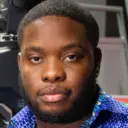 Israel Campos
Israel Campos
BBC News
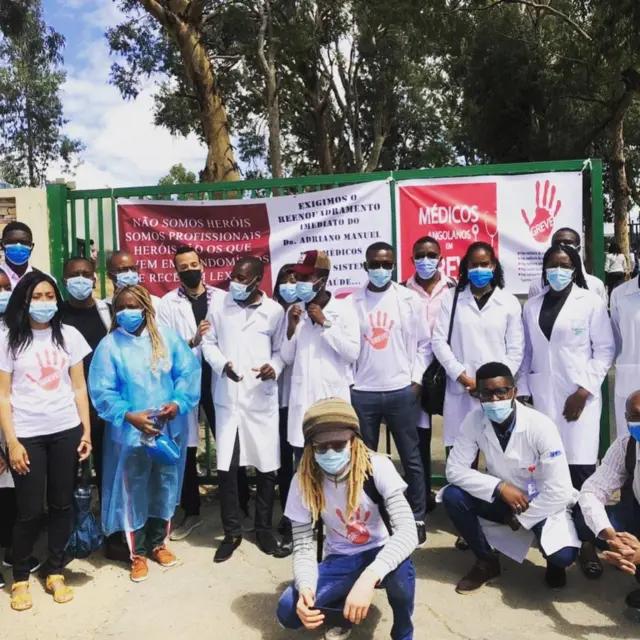 Image source, Vamos Falar de Médicina
Image source, Vamos Falar de MédicinaNearly all doctors in Angola’s public hospitals are now on the fifth day of a national strike to demand better salaries and improvements in working conditions.
The doctors’ union, Sinmea, says some doctors earn less than $520 (£400) a month. Union spokesperson Domingos Zangão told the BBC that this figure was “unacceptable and doesn’t reflect the effort and work the doctors do”.
“Doctors are fed up. We work under difficult circumstances, there are no working conditions for us and we still receive miserable salaries."
Among other demands is the re-employment of union leader Dr Adriano Manuel, who was allegedly suspended from his job after telling the press last year about the death of 19 children at the hospital where he was working.
The Angolan authorities have urged the doctors to return to work saying that they have heard the complaints and will consider them.
Despite this call the union says that the strike will continue until the government “reacts and resolves our major complaints”.
The doctors are still attending to emergency work and intensive care but otherwise there are minimal services available.
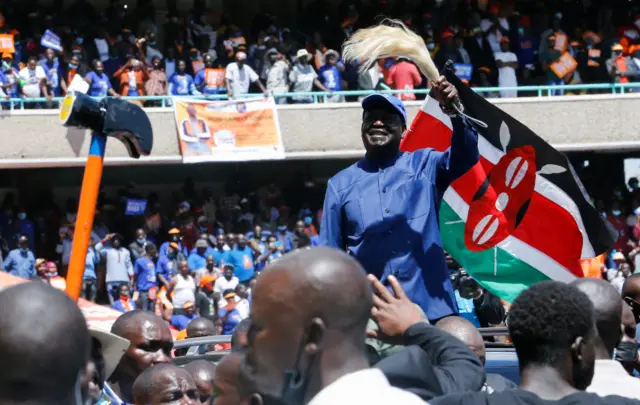 Image source, Reuters
Image source, ReutersVeteran Kenyan opposition leader Raila Odinga has ended months of speculation and announced that he will run for president in next August's elections.
The 76-year-old is a popular politician despite having lost presidential races on four previous occasions - 1997, 2007, 2013 and 2017.
The most recent poll saw him run against President Uhuru Kenyatta. But the two men have since moved closer following their famous 2018 "handshake" aimed at ending divisions which have proved so deadly.
"I do hereby accept to present myself as a presidential candidate for the presidential elections of the 9th of August 2022," the AFP news agency quotes him as telling cheering supporters at a Nairobi stadium.
Mr Odinga's main rival for the top job is likely to be the current Deputy President, William Ruto. The current president will be constitutionally barred from running as he will have served two terms.
Mr Ruto has presented himself as being on the side of the "hustlers" against the "dynasties".
Hustlers refer to those - especially young people - who struggle to make ends meet in an economy that is said to be no longer working for them.
The word dynasties, on the other hand, is a moniker to describe wealthy families, like the Kenyattas and Odingas, who are seen to have dominated politics - and the economy - since independence from the UK in 1963.
Read more:
 Will Ross
Will Ross
Africa editor, BBC World Service
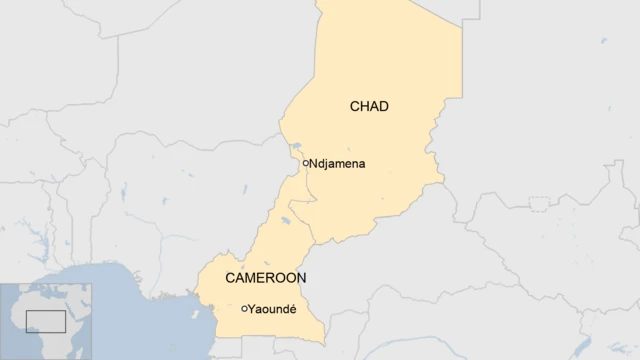
More than 30,000 people have fled from northern Cameroon to neighbouring Chad this week following ethnic clashes that left at least 22 people dead, the UN says.
The violence broke out at the weekend in the border town of Ouloumsa during a dispute between herders, fishermen and farmers over dwindling water resources.
It then spread to neighbouring villages - 10 of which have been burnt to the ground.
The UN refugee agency says three-quarters of those who fled to Chad were women - many of them pregnant - and children.
Last August, similar clashes in northern Cameroon left 40 people dead and led to thousands fleeing over the border.
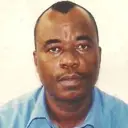 Jonathan Paye-Layleh
Jonathan Paye-Layleh
BBC News, Monrovia
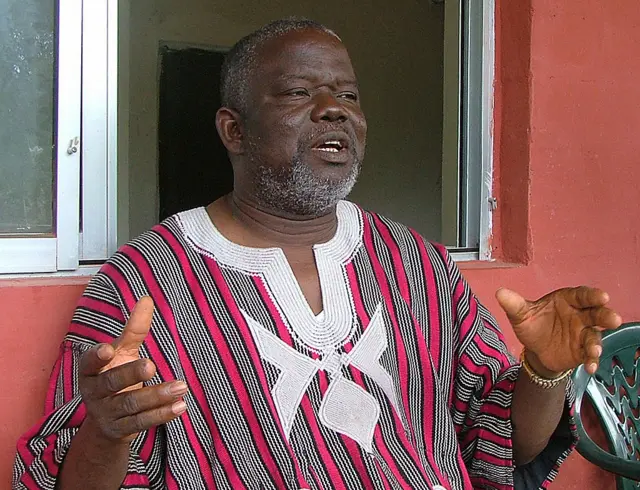 Image source, AFP
Image source, AFPPrince Johnson, seen here in 2008, is a senator and close ally of President George Weah
Liberian senator and former warlord Prince Johnson has said he wants the US to produce the evidence on which it based a decision to impose sanctions on him.
Mr Johnson was on a list of global figures to have so-called Magnitsky sanctions slapped on them, which are directed against people accused of human rights abuses or corruption.
“As a senator, Mr Johnson has been involved in pay-for-play funding with government ministries and organisations for personal enrichment,” a US Treasury statement said, external.
“As part of the scheme, upon receiving funding from the Government of Liberia, the involved government ministries and organisations launder a portion of the funding for return to the involved participants. The pay-for-play funding scheme involves millions of US dollars.”
In response, Mr Johnson said he was waiting for a more detailed explanation from the US government and challenged Washington to explain during which specific administrations in Liberia he had been involved in receiving money for favours.
“What we want is the fact,” he told the BBC.
“You can accuse people, but the evidence is what is important; and coming from Uncle Sam’s website - obviously the most powerful nation on earth whose footprint we follow democratically - so you don’t just destroy peoples’ names by accusing them without facts.”
Mr Johnson was responsible for the slaying in 1990 of President Samuel Doe, who had been captured by his forces during the country’s 14-year civil war.
He is now a very trusted political ally and supporter of President George Weah.
As we reported earlier, the US has also imposed visa restrictions on Isabel dos Santos, the daughter of Angola’s former president.
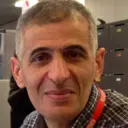 Ahmed Rouaba
Ahmed Rouaba
BBC News
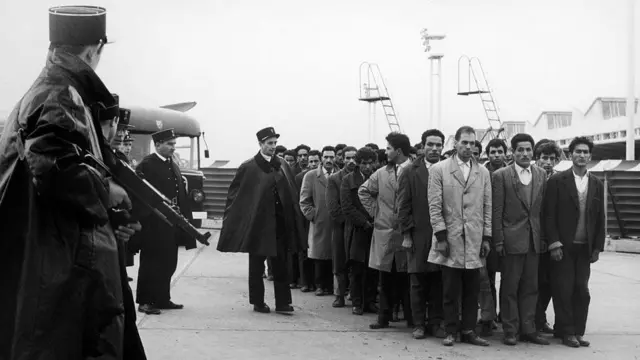 Image source, Getty Images
Image source, Getty ImagesFrance is looking to mend the strained relations with Algeria
French Culture Minister Roselyne Bachelot has announced her country will soon allow access to archive records related to criminal investigations during the Algerian War (1954-1962).
The classified documents are deemed to contain state secrets and it is hoped will help historians and researchers unravel a lot of cases of missing people and killings of Algerians under the French colonial administration.
The move is seen as a goodwill gesture from France to mend the strained relations with Algeria.
The North African country had recalled its ambassador to Paris and closed its airspace to French military flights in October over comments made by French President Emmanuel Macron.
Mr Macron’s comments questioning the existence of an Algerian nation before the French occupation in 1830 has caused outrage and anger in Algeria.
Algerian Foreign Minister Ramtane Lamamra described Mr Macron’s comments as "a memorial bankruptcy" and urged France to "decolonise its history".
French Foreign Minister Jean-Yves Le Drian has made an unexpected visit to Algiers this week in a mission to break the ice and ease tension between the two countries.
Read more:
The Basketball Africa League hopes to expand further in the future, with the second season in 2022 set to see 38 games in Senegal, Egypt and Rwanda.
Read MoreNicolas Negoce
BBC News
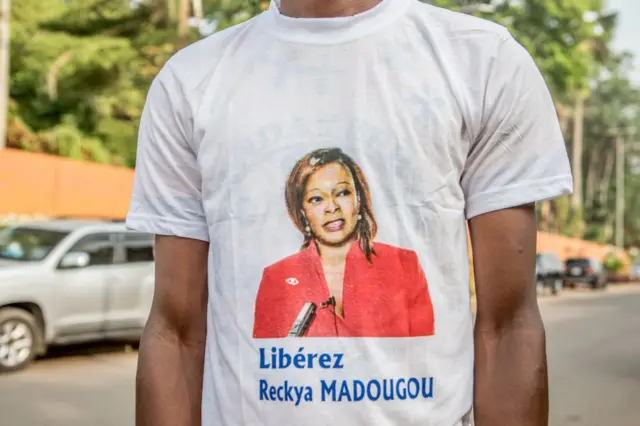 Image source, AFP
Image source, AFPReckya Madougou;s supporters were outside the court in Porto-Novo on Friday
The opposition leader in Benin, Reckya Madougou, has appeared at the country's Economic Crime and Terrorism Court on charges of financing terrorism.
The former justice minister has been detained for more than eight months.
She is the leader of Benin's largest opposition party - the Democrats - and had hoped to be the first female presidential candidate to come from a major party.
But her candidacy was rejected for the presidential election held in April this year.
Ms Madougou has been accused of trying to disrupt the ballot and destabilising the country.
She faces a 20-year sentence if found guilty.
Her lawyers and supporters say the trial is entirely political.
Government officials dismiss claims of political interference and say Benin's judiciary is independent.
Another opposition figure, Joël Aïvo, was sentenced to 10 years in prison on Monday.
The court is expected to deliver its verdict on Friday evening or early Saturday morning.
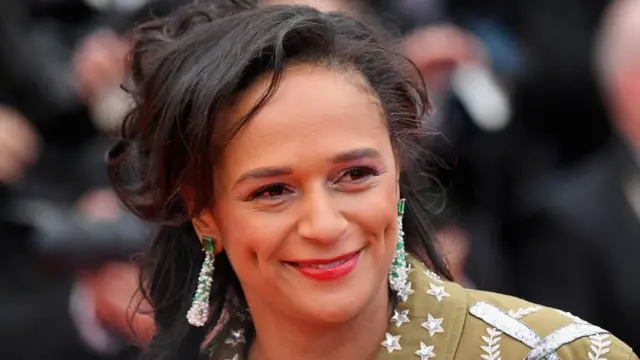 Image source, Getty Images
Image source, Getty ImagesThe US has imposed visa restrictions on Isabel dos Santos, often described as Africa's richest woman, "for her involvement in significant corruption by misappropriating public funds for her personal benefit", a statement from US Secretary of State Anthony Blinken says, external.
Her name appears among a list of other people from across the globe accused of corruption who are facing US sanctions. It was released as part of the US government's anti-corruption drive.
Ms Dos Santos is the daughter of Angola's former president, José Eduardo dos Santos, who left office in 2017. While he was president, she was chair of the state oil company.
Mr Blinken's statement does not go into details about what Ms Dos Santos is accused of having done.
Last year, the BBC reported that leaked documents revealed how she had made her fortune through alleged corruption.
She got access to lucrative deals involving land, oil, diamonds and telecoms when her father was president of Angola.
The documents showed how she and her husband were allowed to buy valuable state assets in a series of suspicious deals.
At the time, Ms Dos Santos said the allegations against her were entirely false and that there was a politically motivated witch-hunt by the Angolan government.
Two other Angolans - Leopoldino Fragoso do Nascimento and Manuel Helder Vieira Dias Juniorare - who were both former government officials have also been targeted.
They have been given so-called Magnitsky sanctions which means that US companies cannot have financial dealings with them.
The US Treasury, external has said that the two men "stole billions of dollars from the Angolan government through embezzlement".
Other Africans named by the US Treasury for other alleged corruption were:
While hospital admissions in South Africa have risen sharply because of the Omicron variant of Covid-19, it is not yet clear if it causes more severe illness, according to comments by Health Minister Joe Phaahla.
Journalist Mia Malan says that the latest figures show that hospital admissions because of the virus have increased by more than 200% this week, compared to last week.
In a series of tweets highlighting the minister's comments, she also said that the reproductive number - sometimes called the 'R rate' - for Omicron is 2.5. In other words, on average, one person infects another 2.5 people.
This is higher than with Delta, reflecting a theory that it is more transmissible.
Allow X content?
This article contains content provided by X. We ask for your permission before anything is loaded, as they may be using cookies and other technologies. You may want to read X’s cookie policy, external and privacy policy, external before accepting. To view this content choose ‘accept and continue’.
On Thursday, South Africa recorded more than 22,000 Covid-19 infections. This is a high figure, but below the high-point of 26,000 daily infections reported during the previous wave of infections, the Reuters news agency reports.
About 38% of South Africans have been vaccinated against coronavirus.
 Azeezat Olaoluwa
Azeezat Olaoluwa
Women’s affairs reporter, BBC News, Lagos
Families in sub-Saharan African countries are spending a large chunk of their household income to educate their children, with many being priced out of quality education, a new report from the UN's education body, Unesco, says, external.
IN Ghana, for example, an average of 13% of a family's expenditure goes on schooling.
Overall in sub-Sharan Africa, nearly 40% of the money spent on education comes from families, rather than other sources such as the government.
In its latest Global Education Monitoring (GEM) report released on Friday, Unesco says there’s a growing risk of inequality and exclusion in providing education.
Manos Antoninis, the report’s director, says the impact of Covid-19 has squeezed family budgets further, making school fees and other costs unaffordable for many.
The report warns that 8% of families in low and middle income countries have to borrow money to pay for their children to go to school.
The rate is even higher in countries like Uganda and Kenya where a third of all families have to take loans to pay school fees.
Unesco wants governments to be more committed to providing 12 years of free quality education for all, for the sake of the poor who cannot afford private education.
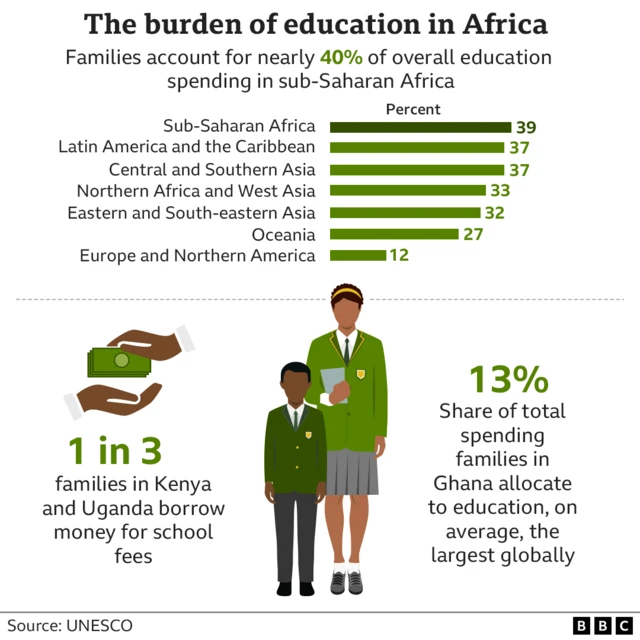
The Ghanaian government has said that from midnight on Sunday all visitors to the country need to be fully vaccinated against coronavirus before being allowed to enter.
Ghanaians who intend to return to the country in the next fortnight are exempted, but will be vaccinated upon arrival, a statement from the country's health service says.
Allow X content?
This article contains content provided by X. We ask for your permission before anything is loaded, as they may be using cookies and other technologies. You may want to read X’s cookie policy, external and privacy policy, external before accepting. To view this content choose ‘accept and continue’.
"All Ghanaians travelling out of the country are to be fully vaccinated," the statement adds.
The order is part of measures to help control the spread of the Omicron variant of Covid-19.
The health service statement says that most cases of the variant in the country were from people who had arrived at the international airport in Accra - and the majority of those people had been unvaccinated.
Ghana has recorded just over 130,000 cases of coronavirus in total and 1,200 deaths.